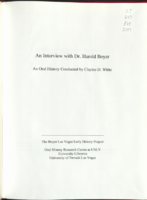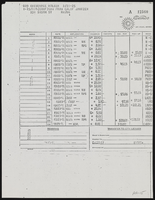Search the Special Collections and Archives Portal
Search Results

Transcript of interview with Dr. Harold Boyer by Claytee D. White, November 15, 2000
Date
Archival Collection
Description
Text

Transcript of interview with Frances Montes by Barbara Agonia, 2001-2002
Date
Archival Collection
Description
Text

Transcript of interview with Ed Walters by David G. Schwartz, April 20, 2015
Date
Archival Collection
Description
Text

Transcript of interview with Bill Zender by David Schwartz, May 27, 2015
Date
Archival Collection
Description
Text

Transcript of interview with Jimmy Wike by David Schwartz, June 02, 2015
Date
Archival Collection
Description
Text

Transcript of interview with Robert Bugbee by John. Lopez, March 16, 1981
Date
Archival Collection
Description
Text

Letter from R. L. Adamson (Los Angeles) to F. H. Knickerbocker, August 18, 1931
Date
Archival Collection
Description
Letter refers to Las Vegas Land and Water Company map, referenced below, showing proposed earthen dam near the Old Mormon Fort. Letter includes estimated construction costs. Mr. Adamson, Chief Engineer of the Union Pacific Railroad, advised against the spending of company money on the project.
Text

Transcript of interview with Steve and Linda Casey by Claytee D. White, June 04, 2014
Date
Archival Collection
Description
Text

Transcript of interview with Priscilla Scalley by Claytee White, July 24, 2014
Date
Archival Collection
Description
Priscilla and Joe Scalley arrived in Las Vegas in 1972 with their two young daughters. Joe had just completed his residency in radiology and came to Las Vegas to practice at Sunrise Hospital, where he eventually became Southern Nevada’s first neuroradiologist. The couple took out two mortgages to buy their house at 2900 Justice Lane, in the Rancho Nevada Estates section of Ward 1. They were the second owners of the house, which had been built in 1967. In 1993, after their daughters had graduated from high school, the Scalleys sold the house and moved to Summerlin. Joe Scalley died in October 1994. After Joe died Priscilla became reacquainted with and married the father of one of her daughters’ childhood friends, Joel Jobst, who was also widowed. Joel was a nuclear physicist retired from the Nevada Test Site. Priscilla and Joel bought a vacation home in Montana, where they spent every summer. They celebrated 13 years of marriage before Joel passed in 2013. As a young mother Priscilla joined the West Charleston Elementary School Parent Teacher Association and eventually became president. She helped found the Friends of the Libraries when the Clark County Library District had only two libraries—Flamingo Library and West Charleston Library—and served as that group’s president. She also was active in Junior League of Las Vegas and was president 1983?84. In her early forties Priscilla became a travel agent, a career that kindled a passion for travel that still burns brightly. She also is interested in genealogy. Although she has traveled the world she yearns to take her daughters, sons in law, and grandchildren to Ireland, the land of her ancestors.
Text

